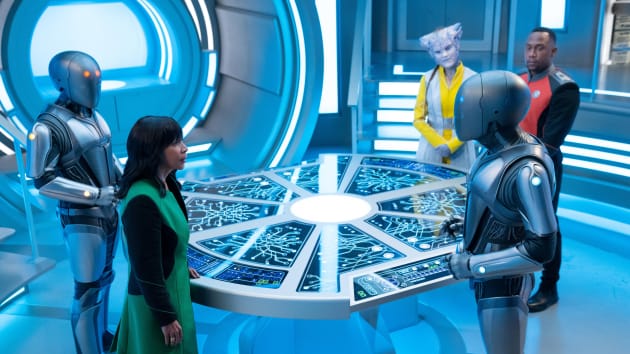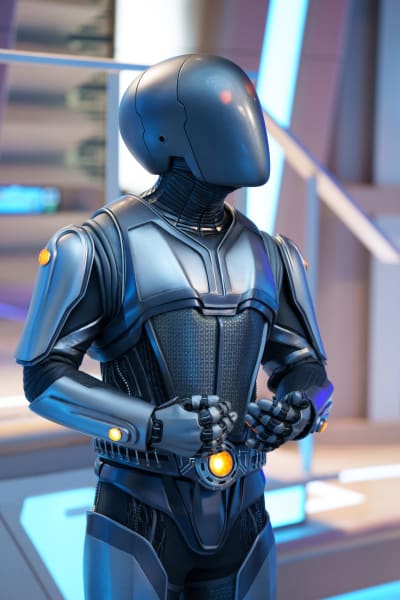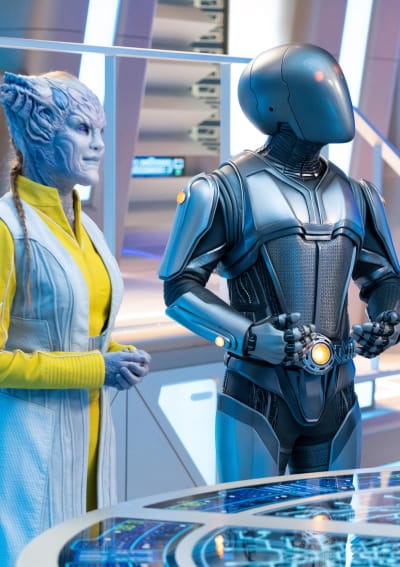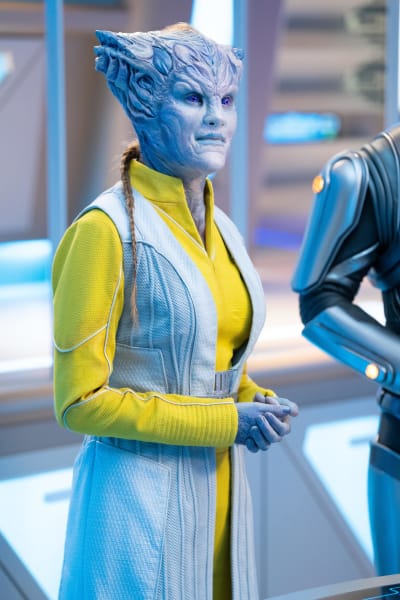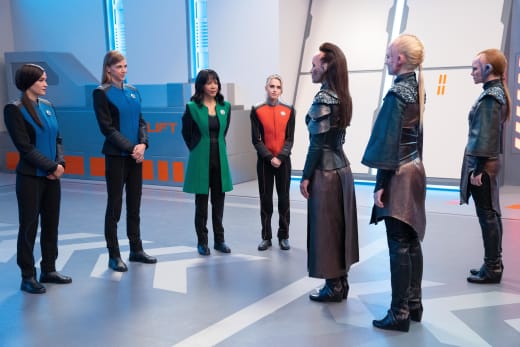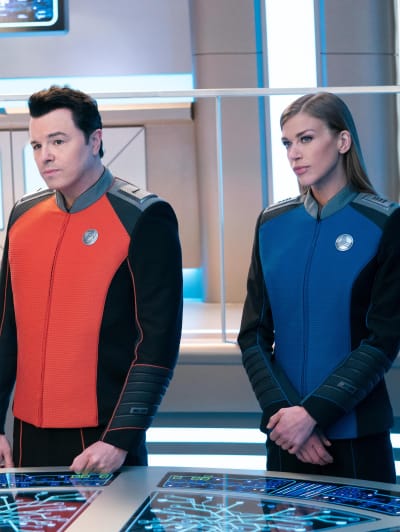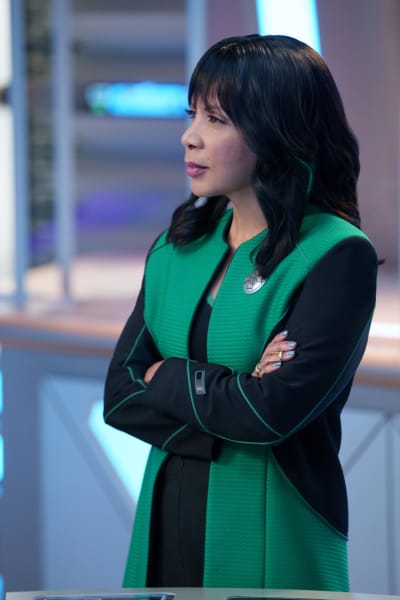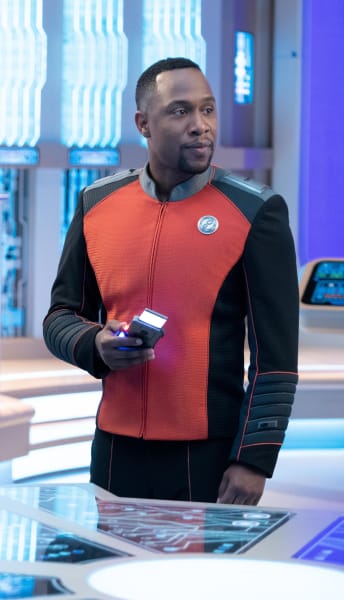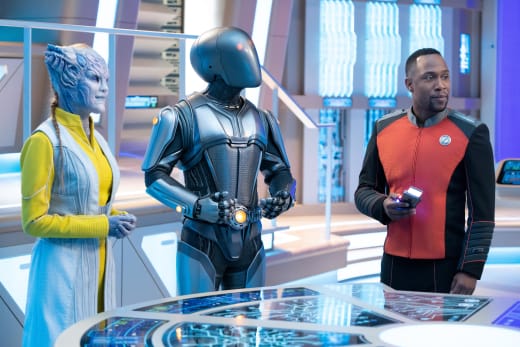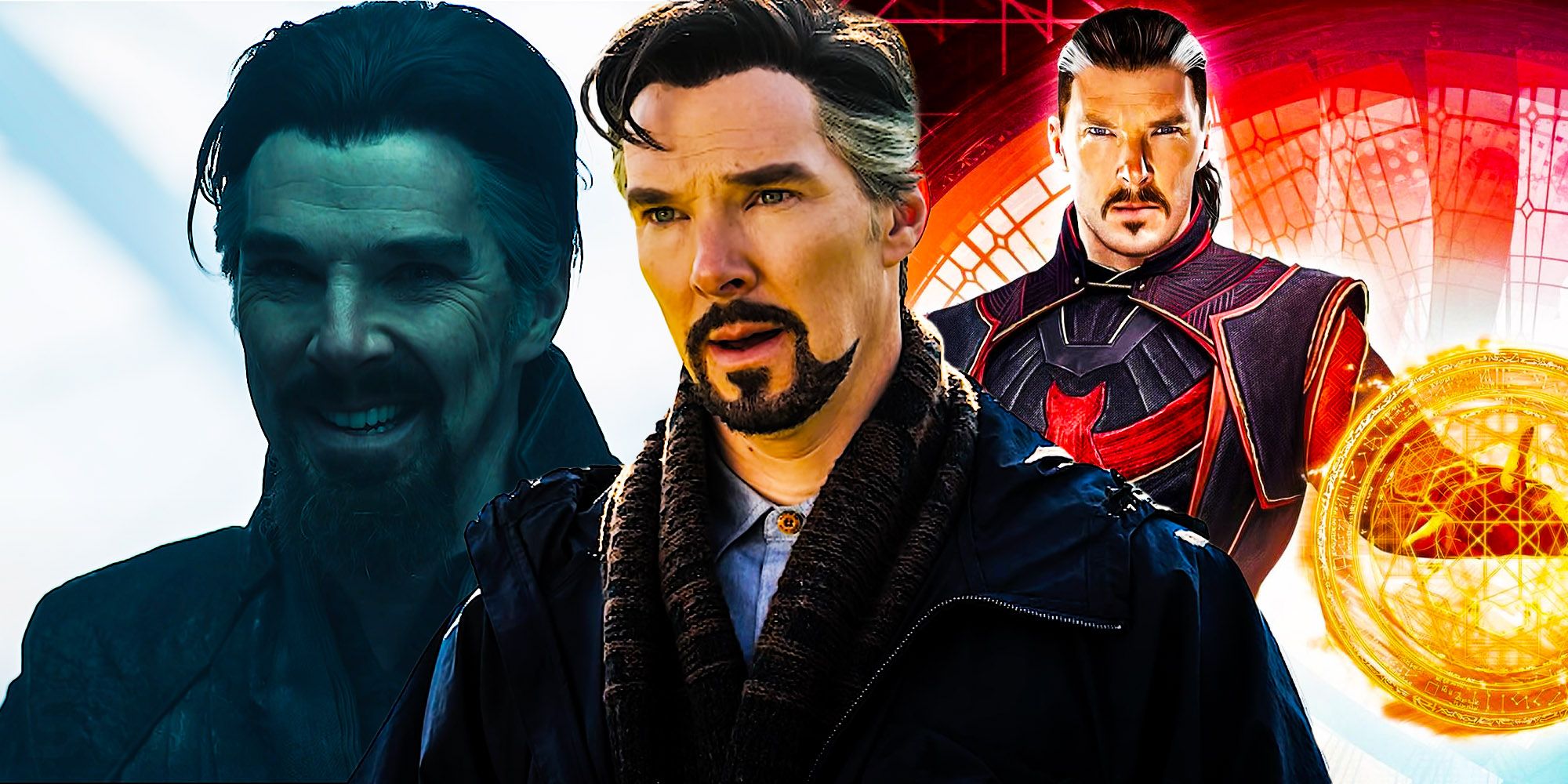This season has been a master class in perspective-taking, and The Orville: New Horizons Season 3 Episode 7 makes my head spin with the kaleidoscope of viewpoints it offers on a myriad of issues.
From diplomatic negotiations to relationship nuances to trauma-rooted prejudices and cultural standards, the crew of The Orville is forced to make hard choices and acknowledge no-win situations.
The narrative gem here is how the backstory of the Kaylons’ uprising against and eradication of their creators, a biological species known only as The Builders, is woven in to significant effect.
With no time markers or geographical captions, the parallel story of the Builder family and K-1 isn’t immediately a clear flashback.
Initially, the possibility existed that providing Kaylons as household mechanical butlers was a Kaylon strategy to infiltrate a planet ignorant of the Kaylon threat.
Granted, as that’s not their established attack strategy (although they did plant Isaac on board a Union ship for recon), it would mean a dramatic shift in purpose.
The unboxing of K-1 is one of those familiar trope scenes where a family gathers around excitedly to celebrate a new addition to the household. Typically, it’s a dishwasher or a car or a puppy. K-1 could’ve easily been the equivalent of a washing machine to a 1950s housewife.
Wenda: Verell, it’s perfect.
Verell: And it’s going to change our lives.
There are obvious parallels between the Kaylon evolution and uprising with the origin story of The Matrix films told by the two parts of “The Second Renaissance,” The Animatrix Episodes 2 and 3.
The Kaylons were just more efficient in wiping out their biological overlords.
I’d be lying if I didn’t suspect Timmis and Dr. Villka of hiding some sort of scheme. Dr. Villka’s deceased father and Timmis’s effusive nature seemed like hints at something nefarious.
I was leaning towards Timmis’s neural modifications actually being Dr. Villka’s father somehow cybernetically stored in the Kaylon matrix. That’s what I get for over-thinking things.
Timmis’s enthusiasm for Isaac to undergo the same procedure also smacked of Lore taunting Data with the emotion chip on Star Trek: The Next Generation Season 7 Episode 1.
Isaac, you can’t even fathom the sensations. To feel joy, happiness, affection, love. Even anger and sadness offer an exhilarating tingle.
Timmis
Apparently, I fell for all the red herrings here.
Ultimately, the K-1 flashback plot and Timmis’s eloquent remorse for his role in the Kaylon war combine to open Burke’s eyes to how her hatred of Kaylons is founded in the same fear and trauma the Kaylons retain from their experience with The Builders.
The title, “From Unknown Graves,” is a quote from Henry Wadsworth Longfellow’s poem, “The Witnesses,” a lament for those who die enslaved in the oceans and on land. Their spirits bear witness just as Kaylons retain perfect records of the cruelty The Builders treated them.
To draw another comparison to The Animatrix, the biologicals win the trial against B1-66ER with a line from Dred Scott v. Sandford which explicitly excludes African Americans from the rights and protections under the Constitution, reasoning that a being that is owned cannot expect to have its safety or liberty guaranteed.
This injustice is echoed in Verell’s assertion that K-1 is their property, and property doesn’t have rights.
Another take on the hierarchy of society is the Janisi, a predictable and welcome balance to the Moclans. Their presence on the ship provides the opportunity for both physical and ironic humor.
Beginning negotiations with subterfuge is never advisable. While it is Mercer’s idea, Grayson shoulders the responsibility as First Officer for not speaking against it.
As with the Moclans, the Union cannot hope to change the culture of their society, but co-existence is potentially more plausible since the Janisi allow their males to live as males.
I’m still not completely clear on how Grayson and Mercer sharing their former marital relationship worked to win Captain Losha over. Still, it’s reassuring (to me, at least) that both officers now value their excellent working relationship over the sentimentality of their defunct domesticity.
Speaking of relationships, the juxtaposition of Isaac and Dr. Finn’s with LaMarr and Keyali’s is incredibly poignant.
As LaMarr says, the two relationships make up a single functional one if they could only pick and choose the components.
While giving LaMarr a sturdier body isn’t an option (yet!), Isaac’s neural modification gives Dr. Finn just enough time with an emotionally responsive Isaac to break her heart.
Dr. Finn: How does it feel?
Isaac: Immense. Enveloping. And terrible. Just the anticipation of seeing you… the waiting… I understood hunger. Loneliness.
Kudos to Mark Jackson for turning in a genuinely believable Isaac with emotions. Bursting with feelings and intentions and very inefficient impulses, he retains the Kaylon’s nature but lights it all up from the inside.
That twitch of a smile when he sees her changes his whole demeanor, but it’s still Isaac.
I’m of two minds regarding Isaac choosing to undergo the procedure at Dr. Finn’s request.
I appreciate Grayson’s likening it to asking a partner to get therapy for mental health, but I wonder if it’s a fair comparison.
Going to therapy supports an individual to be their best self. Isaac’s natural self is without emotion, so is giving him emotions truly him anymore?
Mind you, Dr. Finn has always believed the emotions are there but that Isaac doesn’t recognize them as such. Dr. Villka’s work with Timmis may back that up.
The bottom line here is that we are all a sum of our experiences, and we are all more than how we are perceived.
Dr. Finn doesn’t let Isaac sacrifice his memories in order to fulfill her wish for him to have emotions because then he wouldn’t be the Isaac she fell in love with.
Burke’s experiences in the battle with the Kaylon are legitimate trauma and loss, but her feelings towards them are now tempered with an understanding of what they went through with the Builders.
Reflecting the Janisi’s beliefs back on them with a charade fails where honesty and openness found root. Mercer and Grayson make an assumption, believing the Janisi needed common culture more than transparency.
I’m still kind of rooting for LaMarr and Keyali because Love should find a way, but — like Dr. Finn and her brief moment with emotionally accessible Isaac — maybe their time together will be enough for something else to develop.
Keyali: I don’t want to hurt you.
LaMarr: Cool, let’s make this work.
Keyali: No, I mean physically hurt you. I’ve already injured you three times. And we’re lucky it hasn’t been more serious. This is just a problem that comes up with Xelayans and other species during sex. People have been killed.
LaMarr: That’s a good way to go.
For LaMarr to find love with the one partner he can’t be with feels like a twist on his here-for-a-good-time-not-a-long-time image, while Keyali tough exterior hides a vulnerable soul.
There’s a lot to unpack here, Fanatics. What was your a-ha moment this time around?
Hit our comments with your thoughts and theories!
Diana Keng is a staff writer for TV Fanatic. Follow her on Twitter.














































